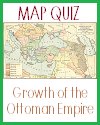Learning games offer substantial educational value for high school World History students studying the Ottoman Empire by making complex historical content more interactive, engaging, and memorable. Through simulations, role-playing, quizzes, and strategy-based games, students can explore the empire's politics, culture, military expansion, and social structures in dynamic ways that promote active learning.
For example, role-playing games where students act as Ottoman sultans, viziers, or European diplomats can foster a deeper understanding of historical decision-making, diplomacy, and leadership. Strategy games that simulate empire-building or resource management help students grasp the challenges the Ottomans faced in governing a vast, diverse territory. Trivia games or digital quizzes can reinforce key facts about important battles, trade routes, or cultural achievements.
These games also encourage collaboration, critical thinking, and problem-solving. By working in teams or competing in friendly challenges, students become more engaged and motivated to retain information. Games can also be adapted to different learning levels, allowing teachers to tailor activities to meet specific educational goals.
Incorporating games into World History lessons not only enhances understanding of the Ottoman Empire but also builds essential academic and social skills. By turning historical learning into an active and enjoyable experience, games make the subject matter more relatable and accessible to a wide range of students.
|

















































